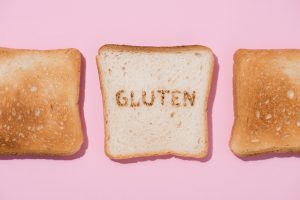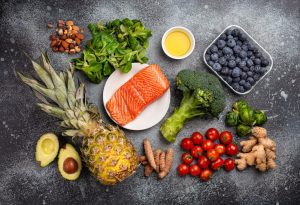Imagine you’re at a family gathering, savoring your favorite fried chicken, when a well-meaning relative mentions, ‘Midlife weight gain is common, especially for women.’ You’ve noticed your clothes fitting a little tighter, and that scale inching up, but you’re not ready to give up the foods you love.
Here’s the good news: you don’t have to completely overhaul your diet or live on celery sticks. It’s about making smarter choices and understanding which foods contribute to midlife weight gain.
As we approach mid-life, often as early as our late thirties and well into the fifties, our bodies undergo significant changes. What used to work for us in terms of diet and exercise no longer yields the same results. This can be a source of frustration for many women who find that even diets that once worked are now ineffective, signaling a deeper issue—metabolic damage from extreme dieting. The key to moving forward is healing your metabolism first.
So, what if you knew exactly which foods to avoid to keep that pesky weight at bay? Would it make a difference to your waistline, your energy levels, and how you feel about yourself?
Dr. Gala’s Quick Take
Yes, stopping midlife weight gain with simple food swaps involves replacing low quality, high calorie foods with healthier alternatives, like choosing protein-rich snacks and slow carbs. This approach reduces the insulin spike often associated with higher calorie options without sacrificing fullness or nutrition.
How to Stop Midlife Weight Gain with Simple Food Swaps
Don’t let midlife weight gain get you down; you can stop it in its tracks with a few simple food swaps that not only taste great but also nourish your body. Improving your eating habits can be your secret weapon in your weight loss fight.
From Processed to Real Food
Begin by replacing processed foods, which are often loaded with harmful chemicals, with whole, real foods. This fundamental swap can dramatically improve how your body processes nutrients.
Swap out potato chips for carrots dipped in hummus, a snack high in fiber and flavor. Instead of reaching for cookies, satisfy your sweet tooth with the natural sugars in fruit. You’re not just cutting calories; you’re adding vitamins and nutrients that boost your health.
Spices like cumin, curry, turmeric, and basil can add a kick to your meals without the heat of hot peppers. Lean meats like chicken, turkey, and 90% lean ground beef are protein-rich, satisfying choices that help you avoid unhealthy fats.
Limit Beverages That Spike Blood Sugar And Lead To Insulin Resistance
Reduce alcohol consumption. Red wine is better than a sweet cocktail. Even better is mineral water with a splash of herbal tea (I like to use passion fruit) and a squeeze of fresh lime.
And, there’s no place in your midlife diet for sodas. The reduced sugar and calories versions are worse than the real thing. Just say NO!
Embrace Resistant Starch
Incorporating resistant starch, such as organic potatoes and rice that have been cooked, cooled, and reheated, can help manage blood sugar levels, particularly for those struggling with insulin resistance.
These smart swaps can lower your calorie intake and minimize health risks. For on-the-go meals, pack healthy foods like leftovers or a turkey wrap to avoid fast food’s empty calories.
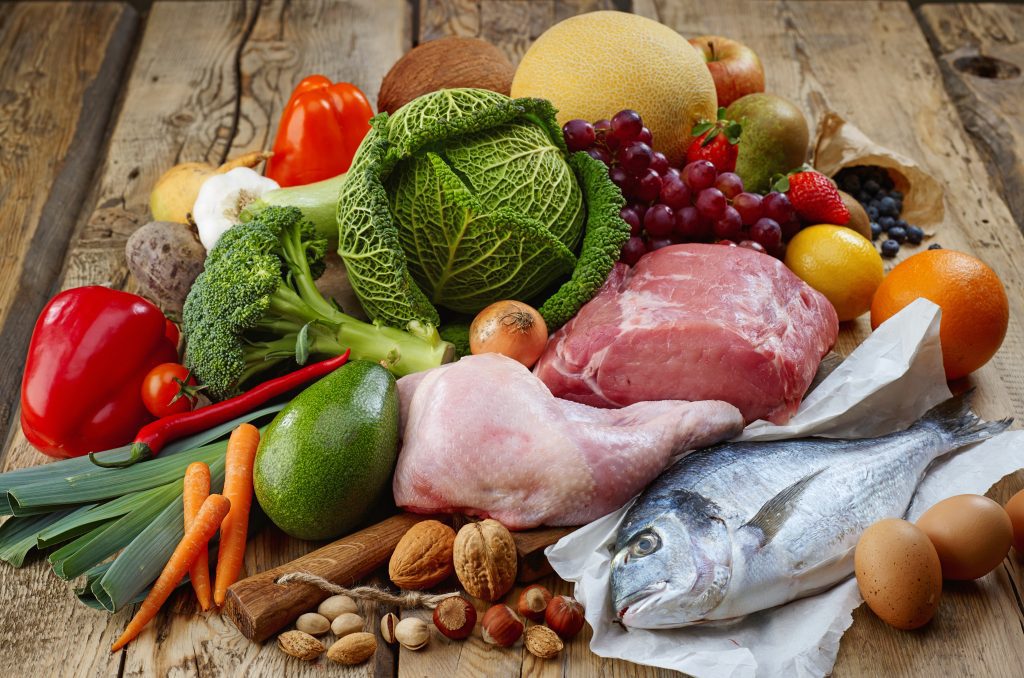
Understanding Nutritional Needs
You’ll find that understanding your nutritional needs, incorporating weight loss-friendly foods, and limiting unhealthy choices are key elements in managing midlife weight gain.
It’s empowering to realize that improving your diet can put you back in charge of your midlife health.
While I don’t agree with every recommendation in the government-produced Dietary Guidelines for Americans, we do agree that you should limit foods and beverages higher in added sugars, saturated fat, and sodium … and limit alcoholic beverages.
Nutrient-dense foods support a healthy diet. What you eat is the most important factor in weight management but, remember, when you eat also plays a role. Early time-restricted eating will make weight management easy … and provide many other health benefits. When we eat high-quality nutrient-dense food, portion control is rarely a factor.
Be open to learning, adapting, and growing in your dietary habits.

Weight Loss Foods
In the journey to manage midlife weight gain, embracing a diet rich in nutritious, weight loss-promoting foods can be a game changer.
It’s not about deprivation, but smart substitutions. Replace unhealthy snacks with fruits and vegetables, full of fiber to keep you satiated. Opt for whole grains instead of refined carbs.
This isn’t just about losing weight, it’s about fueling your body with the nutrients it needs. Your power lies in your choices. Each meal is a chance to nourish yourself, to support your health.
Limiting Unhealthy Choices
While embracing nutritious foods is key, it’s equally important to be mindful of the unhealthy choices that can sneak into your diet and sabotage your health and weight management efforts.
High-sodium snacks and added sugars can lead to weight gain around your midsection. Opting for snacks like edamame or carrots with hummus can be a healthier alternative.
Spicy foods, although they add flavor, can trigger hot flashes, so it’s beneficial to choose milder spices instead.
Choose Fiber and Slow Carbs
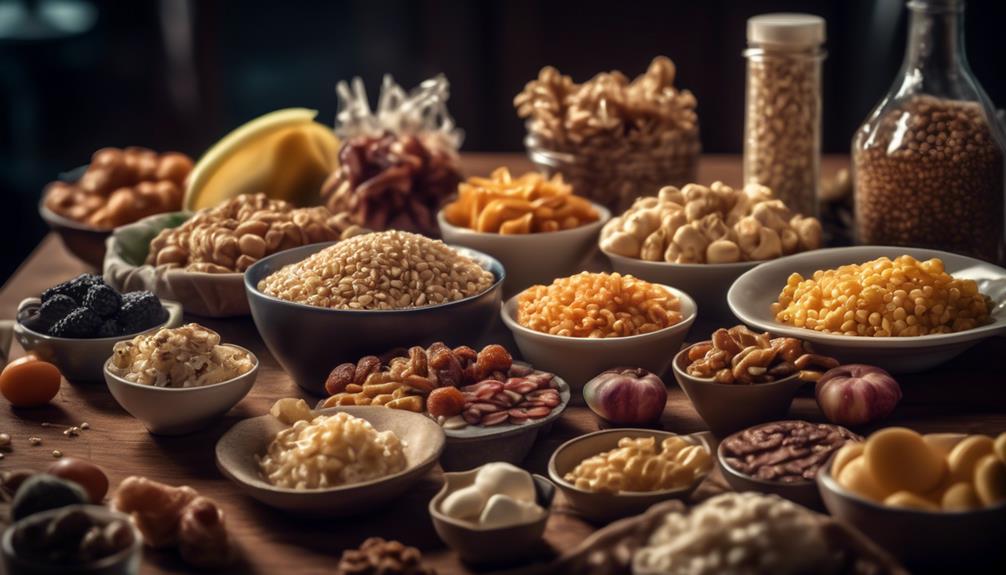
Often, choosing fiber and slow carbs over refined options can truly be your secret weapon in the battle against midlife weight gain. As you navigate through menopause, your body undergoes various changes that make it easier to gain weight and accumulate fat.
URRGGGHH! Am I right?
When you eat a healthy diet high in fiber, you’ll feel fuller for longer, reducing the urge to overeat or snack. Foods rich in fiber like fruits and vegetables act as slow carbs. They take their time to digest, allowing your blood sugar levels to stabilize, not spike, aiding in weight management.
Remember, whole grains may be rich in fiber but they can spike your blood sugar fast, leading to fat storage and an unwelcome increase in your current weight. So, eat whole grains sparingly and choose non-starchy veggies.
High-Quality Protein First
Don’t let midlife weight gain get you down; focusing on high-quality protein first can be a game-changer for managing your weight and health during menopause.
Ensuring you consume 20-30 grams of protein per meal is essential for maintaining muscle mass and metabolic health. Whether you prefer animal-based or plant-based sources, the goal is to build your meals around high-quality proteins, allowing for a balanced intake that supports your body’s requirements.
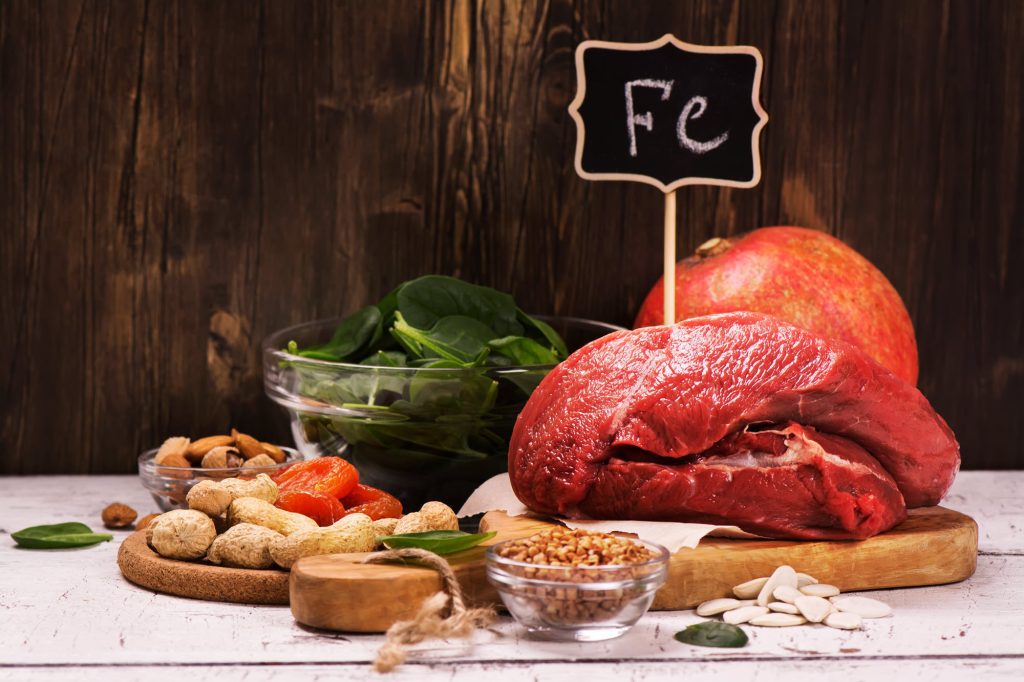
Embrace the power of high-quality protein first. Prioritize sources like lean meats, fish, eggs, and unprocessed plant-based options. Including protein-rich foods at each meal can support your metabolism, maintain muscle mass, and regulate hormones. This isn’t just about weight; it’s about embracing your health and feeling your best during menopause.
High-quality proteins can help manage menopausal weight gain by supporting your muscle health and increasing feelings of fullness. This is your secret weapon against those pesky cravings and blood sugar spikes that can derail your efforts.
Start your meals with high-quality protein to promote satiety and reduce overall calorie intake. This simple change can make a big difference in managing your midlife weight gain. You have the power to make choices that support your health and well-being. Remember, you’re not just managing weight—you’re building a healthier, stronger you.
Acknowledge Food Sensitivities
Understanding and addressing food sensitivities is crucial. If you’re trying to do this yourself … without formal testing, start by eliminating what I refer to as the Fierce Five: dairy, wheat (or gluten), yeast, sugar, and alcohol. These culprits can trigger immune responses and digestive issues … sabotaging your efforts to improve your health and manage weight.

Risks of Calorie Restriction
Have you ever considered the risks associated with drastic calorie restriction in your quest to manage midlife weight gain? By cutting calories too severely, you’re not only denying your body the fuel it needs to function optimally, but you’re also running the risk of nutrient deficiencies and decreased energy levels.
Rather than counting calories or restricting food intake, which can lead to a metabolic slowdown, I advocate for a balanced approach focusing on nutrient-dense meals. Intermittent fasting and time-restricted eating can also be beneficial, introducing variety to your metabolic rate without compromising on nutrition. Aim for two satisfying meals a day, rich in protein, to meet your body’s needs without feeling deprived.
Long-term calorie restriction slows down your metabolism making weight management even more challenging. It can also lead to muscle loss, decreasing your overall strength and health.
And, just when our hormones are struggling to adapt to new conditions, this may further complicate the challenge to balance your hormones … affecting your mood and overall well-being. It’s a slippery slope that may even increase your risk of developing disordered eating patterns.
Calorie restriction is a “race to the bottom.” No one wins. If you feel the need to count calories, make sure you’re consuming at least 1,000 calories every day … including 50 grams of protein.
Lifestyle vs. Diet
The journey towards maintaining a healthy weight and vibrant energy through menopause isn’t about strict dieting; it’s about making informed lifestyle shifts. By focusing on real, whole foods, understanding your body’s unique needs, and incorporating moderate, enjoyable physical activity, you can create a sustainable lifestyle that supports your health and well-being.
As we continue to explore ways to manage stress and its impact on our health, remember that the goal is not to overhaul your life overnight. Small, manageable adjustments can lead to significant improvements in your health and overall quality of life.
The path to wellness is a personal one. I make suggestions based on my training and experience … and it may differ from what you’ll hear from another professional.
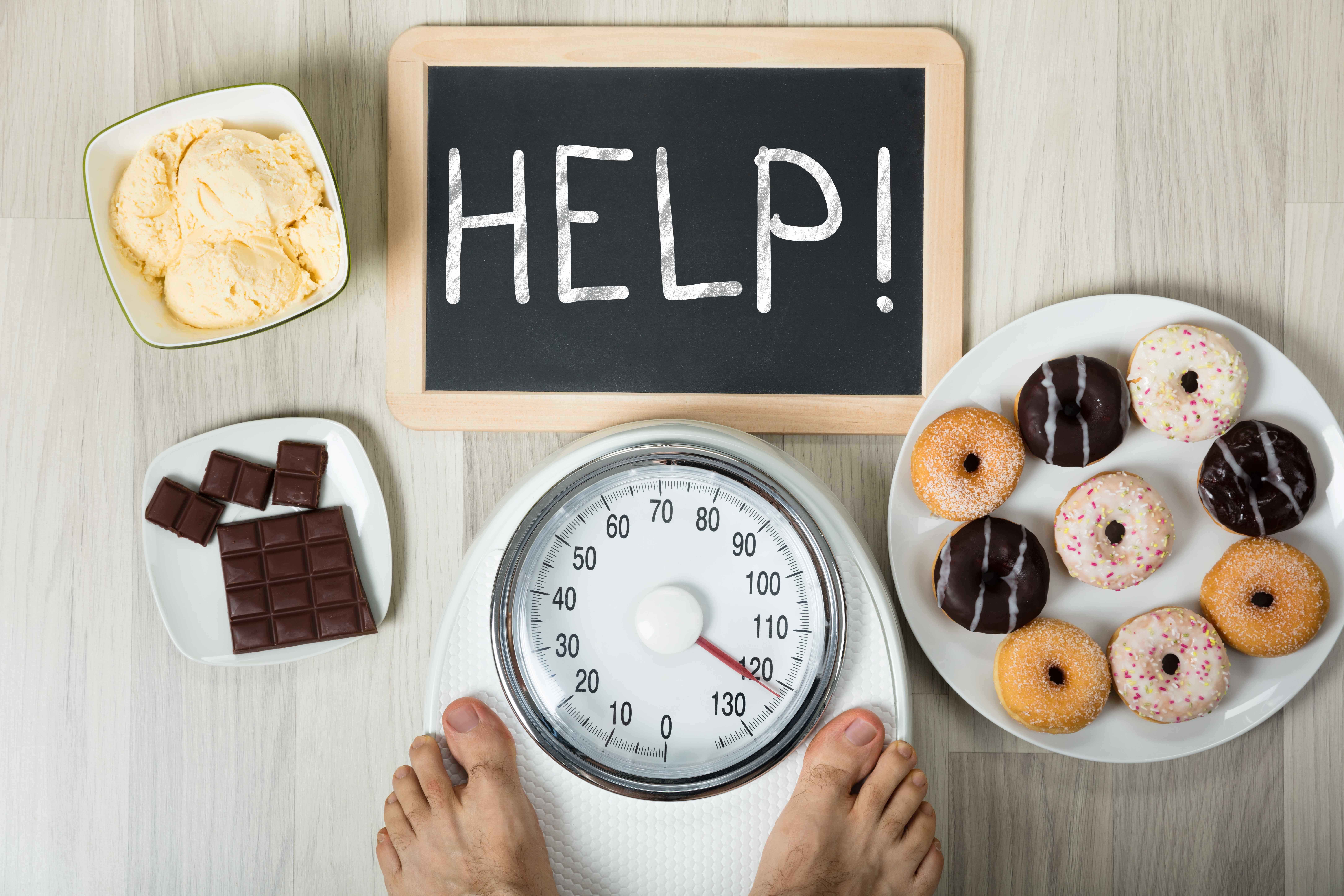
Keep an open mind and try it … if it resonates with you. You can always go back to your previous approach … but I imagine you’re ready to try something a bit different if you’ve read this far! The challenges of mid-life are opportunities for growth and rejuvenation.
Key Takeaways
- Swap unhealthy snacks like potato chips for healthier options such as carrots dipped in hummus to avoid weight gain during midlife.
- Opt for natural sugars found in fruits instead of cookies to satisfy your sweet tooth while managing your weight.
- Choose high-quality protein … like chicken, turkey, and 90% lean ground beef to support weight loss goals.
- Use moderation in alcohol consumption and pack healthy meals for on-the-go to avoid empty calories and reduce calorie intake.
Conclusion
Don’t let midlife weight gain get you down. Make a few smarter choices. Swap unhealthy options for fiber-rich, slow carbs, and quality proteins. Remember, starving isn’t the answer; eating right is.
Your health is worth every smart food swap. Here’s to a healthier, more vibrant you – because you deserve nothing less. It’s time to take control, one bite at a time.
“If you came into my office, I’d ask you a lot of questions that would help us connect the dots … so that together we can deal with your toxic stress.
Every situation is unique and you need a plan that works for you. Not a one-size-fits-all solution.
If you’re thinking you can’t come into my office, don’t worry. I’ve created a program with all of my initial recommendations to help you unravel the mystery. You can use it at home and at your convenience.
So if you’re thinking that managing chronic stress just isn’t possible … or even the answer … for you, I want to show you what you may be missing.
And how you can identify the toxic stressors that are creating your symptoms with my Human Energy System Reboot. You can get started HERE.” – Dr. Gala



